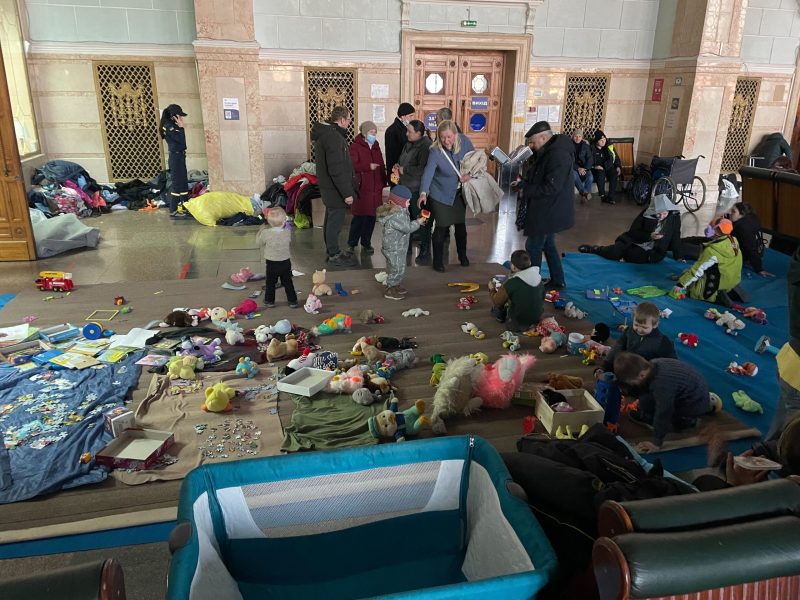
Ukranian refugees vulnerable to human trafficking triggers concern

As the Russia Ukraine war rages on, international agencies are getting increasingly concerned about millions of vulnerable women and children fleeing to borders countries being exposed to the risk of being sexually exploited, abused or targetted by human traffickers.
The UNHCR has expressed serious concern to international media that since all the refugees are largely women and children there is anxiety and worry about the threat of trafficking and also sexual exploitation and abuse. Traffickers are always on the lookout for people in such situations so that they can take advantage of them, said the agency.
More than 2.5 million people, including more than a million children, have already fled war-torn Ukraine in what has become an unprecedented humanitarian crisis in Europe, according to the refugee agency.
People in the border nations of Romania, Poland, Hungary, Moldova and Slovakia, private citizens and volunteers have been offering help in the form of free shelter, free transport, work opportunities and other forms of assistance to the desperate, emotionally-wrought Ukrainian refugees. But in this chaotic situation there are people waiting to prey on these vulnerable people as well.
According to a AP report, police in Wroclaw, Poland detained a 49-year-old suspect on rape charges after he allegedly assaulted a 19-year-old Ukrainian refugee, who did not speak Polish. He had reportedly told her over the internet that he would help her.
Further, Tamara Barnett, director of operations at Human Trafficking Foundation, a UK-based charity told AP that when there is a “huge cohort of really vulnerable people” who need money and assistance immediately, it then becomes a sort of a “breeding ground” for exploitative situations and sexual exploitation.
The people fleeing Ukraine are under emotional stress, trauma, fear, confusion and that makes them vulnerable and they could become easy targets for abduction and rape.
Also read: Russian forces close in as official vows: ‘Kyiv will stand until the end’
Human traffickers thrive on the helplessness of refugees
Traffickers thrive on “the inability of families and communities to protect themselves and their children,” said the Migration Data Portal on the subject of humanitarian crisis triggered by wars and how it can increase trafficking.
Human trafficking, which is a huge concern in the European Union, can take the form of sexual exploitation, such as prostitution, forced labour, domestic slavery, organ removal or forced criminality etc. According to a 2020 EU human trafficking report, three quarters of all victims are female with almost every fourth victim a child. There is an estimated annual global profit of USD 32 billion from this crime.
A large proportion of the refugees arriving in the border countries want to journey on to friends or family elsewhere in Europe and turn to strangers, hoping they are good samaritans, to reach their destinations.
Vlad Gheorghe, a Romanian member of the European Parliament started a Facebook group called United for Ukraine and it has 250,000 members. They pools resources to help refugees, including accommodation but no offer for volunteering or stay or anything goes unchecked. There is fear among foreign NGOs that refugees being offered shelter in exchange for services such as cleaning and babysitting could lead to exploitation.
The ones that are most vulnerable to human trafficking will be women and children with no connections family, friends and other networks of support. And as the conflict continues, this will mean that more people will be pouring into neighbouring countries.
Authorities on the lookout
Meanwhile, the authorities are being extra-vigilant in the border countries to prevent human trafficking and other crimes. Berlin police have warned women and children through a social media post in Ukrainian and Russian not to accept offers of overnight stays. While plain-clothed intelligence officers in Romania and Poland were also keeping a close watch on such criminal activity.
Men offering free rides to women are being turned away by authorities in Siret, a border town in Romania. Police at the Siret border are working closely with the country’s national agency against human trafficking and other law enforcement to try to prevent crimes, said media reports.
At Poland’s Medyka border, former members of the French Foreign Legion, an elite military force, are voluntarily providing their own security to refugees and keeping a keen watch for traffickers. “The risk is very high because there are so many people you just don’t know who is doing what,” admitted a member of the legion, and this probably sums up the chaos reigning in these border countries.

